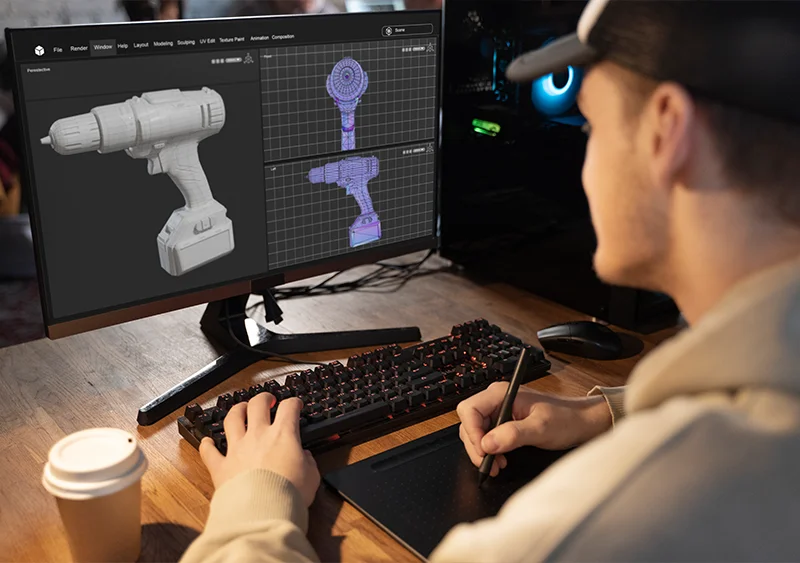Outsourcing 3D Modeling – The Ultimate Guide: How to Find the Right Partner and Maximize Your ROI
The Complete Guide to Outsourcing 3D Modeling: Choosing the Right Partner & Boosting Your ROI

7 MIN READ
February 25, 2025

Written By
Sasikumar Janakiraman
Outsourcing 3D modeling is not just a cost-cutting measure. It is a strategic move that enables businesses to accelerate project timelines, tap into specialized talent, and maintain agility in a competitive market. Whether you need photorealistic renders, technical CAD models, or complex animations, the right outsourcing partner can help you scale efficiently without compromising quality.
In this blog post, we will cover all aspects of outsourcing 3D modeling, from choosing the right partner to maximizing efficiency and ensuring the best return on investment.
Why Outsource 3D Modeling?
Outsourcing 3D modeling is a strategic approach that helps companies remain agile and competitive.
Many businesses face challenges when handling complex 3D projects in-house, whether due to limited resources or the need for specialized expertise. By turning to external partners, companies can improve quality, meet deadlines, and drive innovation.
1. Access to Specialized Talent
Working with an external 3D modeling provider gives you access to professionals who have dedicated their careers to mastering the craft. These experts have often worked on a wide range of projects—from product design to architectural visualization and can offer insights that go beyond technical execution. Their focused experience can elevate the final outcome and ensure that your project meets high standards.
2. Cost Efficiency
Maintaining an in-house 3D modeling team can be expensive. Expenses such as salaries, software licenses, and ongoing training add up quickly. Outsourcing provides a more flexible financial model. Companies can engage specialists on a project-by-project basis, thereby reducing overhead and avoiding the long-term costs associated with a permanent staff.
3. Speed and Scalability
Outsourced teams are well-equipped with the latest tools and efficient workflows that enable them to complete projects quickly. Furthermore, these teams can easily scale their efforts to accommodate changes in project scope, ensuring that your business can adapt to evolving demands without compromising quality.
4. Focus on Core Business Functions
Outsourcing 3D modeling allows your internal teams to concentrate on core business activities. When experts handle the detailed aspects of 3D design, your organization can allocate more time and resources to strategic initiatives and customer-focused projects. This focus often leads to higher overall productivity and a clearer path to achieving business goals.
5. Global Reach
The outsourcing model breaks down geographical barriers. By collaborating with 3D modeling professionals from around the world, you gain access to a diverse pool of talent and innovative ideas. This global perspective can introduce fresh approaches to your projects and help you stay ahead in a competitive marketplace. By choosing to outsource 3D modeling, companies can strategically leverage specialized expertise while optimizing costs and maintaining a strong focus on their core operations.
How to Choose the Right 3D Modeling Partner
The success of your 3D modeling project depends on the expertise and reliability of your outsourcing partner.
Selecting the right provider is not just about finding a skilled team but ensuring they align with your industry needs, quality expectations, and business goals. Here are the key factors to consider when choosing a 3D modeling partner.
1. Industry-Specific Experience
Not all 3D modeling services are the same. A partner with experience in your industry understands the nuances of your project requirements, whether in architecture, product design, gaming, or e-commerce. Review their portfolio to see if they have worked on projects similar to yours and can deliver the level of detail and precision you need.
2. Quality and Attention to Detail
Examine their past work to assess render quality, realism, and technical precision. A strong portfolio with high-quality 3D renders and well-executed models is a good indicator of their capabilities. Look for detailed textures, lighting accuracy, and lifelike representations to ensure they can meet your expectations.
3. Communication and Workflow Efficiency
Seamless collaboration is critical for successful outsourcing. Choose a provider who is responsive, clear in their communication, and open to feedback. Miscommunication can lead to costly revisions and project delays, so ensure they have structured workflows, regular check-ins, and a clear revision policy.
4. Technical Proficiency and Software Expertise
The 3D modeling industry evolves rapidly, with advancements in software, rendering engines, and automation tools. Ensure your partner is proficient in industry-standard tools such as Blender, AutoCAD, SketchUp, V-Ray, or 3ds Max, depending on your project needs. Up-to-date expertise ensures compatibility with your workflows and the latest industry standards.
5. Cost and Value Alignment
Budget matters, but the lowest price does not always equate to the best value.
A reliable 3D modeling partner offers a balance of cost and quality. Be cautious of providers offering extremely low rates, as they may cut corners, leading to subpar models and missed deadlines. Instead, focus on partners who provide transparent pricing, clear deliverables, and a track record of quality work.
Prioritizing industry expertise, quality, communication, and technical proficiency will help you find a provider that aligns with your business needs and ensures a smooth, efficient collaboration.
The Outsourcing Process: How It Works
Outsourcing 3D modeling is a structured process that ensures seamless collaboration and high-quality results. Each step requires clear communication, defined expectations, and iterative feedback to align with project goals. Here's how the typical outsourcing workflow unfolds.
1. Define Your Project Requirements
Before engaging with a 3D modeling partner, establish clear project requirements. This includes:
- The type of model needed, such as product design, architectural visualization, or character animation
- The level of detail, whether low-poly for gaming or photorealistic for marketing and presentations
- The scope, including file formats, textures, animations, or interactive elements
- Deadlines and expected deliverables to ensure alignment with your timeline
A well-defined brief minimizes revisions, speeds up production, and ensures the final output meets expectations.
2. Research and Select the Right Partner
With requirements in place, begin evaluating potential outsourcing providers. Look for:
- Industry expertise relevant to your project
- A strong portfolio showcasing similar work
- Client reviews and testimonials to assess reliability and professionalism
- Scalability and flexibility to meet evolving project needs
Have a detailed discussion with shortlisted providers to gauge their understanding of your requirements and their approach to collaboration.
3. Initial Consultation and Proposal
Once a partner is selected, they will provide an initial consultation to refine project scope, timelines, and budget. A detailed proposal typically includes:
- Project milestones and estimated completion dates
- The cost structure and payment terms
- Deliverables, including formats and resolution requirements
- Policies on revisions and communication channels
This phase ensures clarity on both sides before work begins.
4. Design and 3D Modeling Phase
The production team begins working on the 3D models based on the agreed specifications. During this stage:
- Regular updates and draft previews help align expectations
- Iterative feedback ensures necessary refinements are made early
- Communication is maintained to avoid last-minute revisions
The goal is to achieve the desired output efficiently while ensuring high-quality modeling and texturing.
5. Review and Finalization
Once the 3D models are completed, they go through a final review process. At this stage:
- The models are checked for accuracy, resolution, and detailing
- Clients provide feedback and request adjustments if needed
- Final assets are delivered in the required formats, such as OBJ, FBX, STL, or 3DS
A reliable outsourcing partner ensures smooth revisions and accommodates last-minute refinements.
6. Post-Production and Integration
After final approval, the models may require additional processing, such as:
- Integration into marketing materials, animations, or AR/VR applications
- Lighting, rendering, and texture optimization for different platforms
- Technical adjustments for game engines or 3D printing
A strategic outsourcing partner provides post-production support to ensure seamless implementation into your workflow.
A well-managed outsourcing process enhances efficiency, ensures scalability, and delivers high-quality 3D assets tailored to business needs.
Mistakes to Avoid When Outsourcing 3D Modeling
While outsourcing offers many benefits, it's important to approach it with caution. Here are common mistakes to avoid when outsourcing 3D modeling:
- Skipping the research process: Don't rush into choosing a partner without doing thorough research. Make sure they have the necessary skills, experience, and portfolio to meet your project's requirements.
- Lack of clear communication: Failing to communicate expectations and project goals clearly can lead to misunderstandings and subpar results. Be detailed in your initial discussions and provide feedback throughout the project.
- Ignoring budget constraints: While outsourcing can be cost-effective, it's easy to go over budget if you're not careful. Set a clear budget and ensure that the project stays within it by discussing pricing upfront.
- Overlooking post-production requirements: Some outsourced teams may deliver the models but not provide assistance with post-production tasks like rendering or integration. Make sure you clarify these expectations in advance.
Closing thoughts
Outsourcing 3D modeling is a powerful way to enhance efficiency, reduce costs, and gain access to specialized expertise. It allows businesses to scale operations, meet tight deadlines, and produce high-quality visuals without the overhead of an in-house team. With the right outsourcing partner and a structured workflow, companies can achieve outstanding results that drive innovation and competitiveness.
For architects, product designers, and marketers seeking top-tier 3D modeling solutions, outsourcing can be a game-changer. Zealous 3D Design Studio specializes in high-end 3D rendering, delivering photorealistic models with precision and attention to detail.
Let's create something extraordinary together. Reach out to Zealous 3D Design Studio and bring your vision to life!
About the writer :
Sasikumar Janakiraman, as the Creative Director at Zealous Services, brings a unique mix of creativity and technical ... skill. He’s passionate about 2D and 3D design, leading teams to create stunning 3D models and visualizations. Sasikumar loves working closely with clients, making sure their ideas come to life in the best possible way. His goal? To make design feel simple and exciting.
Read MoreFrequently Asked Questions (FAQ)
Why should I outsource 3D modeling instead of handling it in-house?
Building an in-house 3D modeling team is expensive. You need top-tier software, experienced professionals, and time to manage everything. Outsourcing gives you access to specialized talent, faster turnaround times, and significant cost savings - without the hassle of hiring and training.
How do I find the right 3D modeling partner?
Not all 3D modeling services are created equal. Look for a strong portfolio, industry expertise, transparent pricing, and solid client reviews. A great partner should understand your project needs, deliver high-quality work, and offer clear communication throughout the process.
What industries benefit the most from 3D modeling outsourcing?
Industries like architecture, real estate, product design, gaming, and manufacturing rely heavily on 3D modeling. Whether you need realistic renderings, prototypes, or immersive environments, outsourcing helps you scale and innovate without delays.
How much does outsourcing 3D modeling cost?
Pricing varies based on project complexity, level of detail, software requirements, and turnaround time. Some providers charge hourly, while others offer per-project or subscription-based pricing. To maximize ROI, find a partner that balances affordability with quality.
How do I ensure high-quality results from an outsourced 3D modeling team?
Set clear expectations from the start. Provide detailed project briefs, reference materials, and feedback loops to ensure alignment. The best outsourcing partners will also have revision policies and quality control measures to guarantee top-tier results